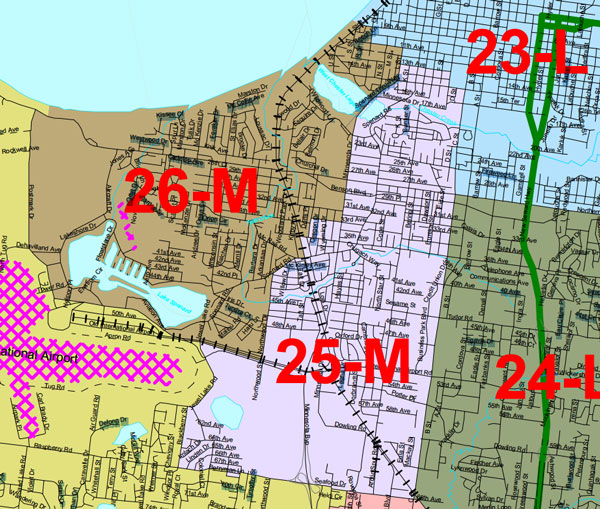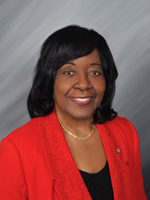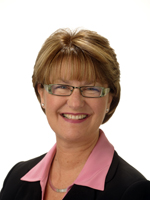
A Republican representative from the state House – Anna Fairclough is hoping to unseat long term Democratic Senator Bettye Davis from Anchorage. Redistricting changed the playing field. The new Senate district now includes Eagle River where Fairclough has been a popular candidate in the past.

Because of redistricting, Senator Bettye Davis’ is running in a district that includes a lot of new territory. The new district includes less of East Anchorage, which she considers a stronghold, and adds some of Eagle River, which tends to lean more conservative. But Davis, who has served in the legislature for more than a decade, says she doesn’t believe that the new portion of her District, in Eagle River, has very different concerns than the rest of the district.
“They probably won’t be much different than they are on the East side of town. But there are certain projects and things that they’ll be asking for or if there’s issues that they have. I have represented part of Eagle River before, but it was on the House side, way back in the 90’s.”
A former nurse, Davis says she hopes to be re-elected so that she can continue passing legislation to address Alaska’s most pressing social issues.
“I’m running for my seat again because I feel that I have many things that I would like to continue my work on particularly in the areas of healthcare and education.”
Davis’ most high profile work in the Senate in recent years has been on Denali Kid Care, a state-run children’s health insurance program for low-income families. Governor Sean Parnell vetoed bills she helped draft to increase funding for the program because he said they included support for abortions.

Fairclough has also focused on socials issues. Most notably, her work in the House of Representative on the Alaska Children’s Trust Bill, which passed in 2010 – it’s a fund set up by the legislature to provide grants to organizations that work to prevent child abuse and neglect. She also has worked for non-profits — with Standing Against Rape where she was the executive director and with Hospice of Anchorage, where she currently works as development director. In addition, she has been in the House of Representatives for six years.
Before that Fairclough spent more than 7 years representing Eagle River on the Anchorage Assembly. She says, if she’s elected, her focus will be on fiscal planning.
“Currently I serve on the house finance committee and have taken up several issues important to all of Alaska, most specifically, fiscal planning. Alaska has a bright future in front of us. But we need to take care of our fiscal house. We need to put that house in order. We have great opportunities on the north slope to access riches for Alaska, but we need to do those responsibly.”
Both candidates say education is a priority. But they disagree on how to improve it. Davis supports more funding for public education and existing district charter schools. She does not think public funding should go to private schools. Fairclough, on the other hand, supports funding that follows students to the school of their parents’ choice.
In Fairclough’s mind money for education is directly linked to oil. She says she would have supported Governor Parnell’s bill to decrease oil taxes that died in the Senate last session. Republicans said it would increase oil production. Democrats called it a give away to the oil companies. Davis says the current tax plan, known as ACES, is working fairly well. On the issue of a gas line, both candidates says there’s a lot of work to be done.
“We have to get on to a real conversations about the knobs that need to be turned, the criteria that need to be changed so that it can be a viable project. Davis: I’m very supportive of the in-state gasline. And I hope that we will move beyond the talk. And I agree that we do need to come together and make sure that we move in that direction because there are people hurting and need that reduction in gas.”
But neither one has specifics about how to jump start a gas lineproject. As far as the bi-partisan coalition is concerned, Fairclough says, if elected, she would not support it. She says the group is often a dead end for bills crafted by her party and it avoids controversial topics.
“It has been ineffective. It hasn’t taken on issues that are critically important to Alaska.”
Davis has worked in the bi-partisan coalition and says she’ll continue to do so because she believes it is critical to collaborate across party lines.
- Alaska State Legislature: Bettye Davis
- Alaska State Legislature: Anna Fairclough
- Anchorage Bowl Voting District Maps
Daysha Eaton is a contributor with the Alaska Public Radio Network.
Daysha Eaton holds a B.A. from Evergreen State College, and a M.A. from the University of Southern California. Daysha got her start in radio at Seattle public radio stations, KPLU and KUOW. Before coming to KBBI, she was the News Director at KYUK in Bethel. She has also worked as the Southcentral Reporter for KSKA in Anchorage.
Daysha's work has appeared on NPR's "Morning Edition" and "All Things Considered", PRI's "The World" and "National Native News". She's happy to take assignments, and to get news tips, which are best sent via email.
Daysha became a journalist because she believes in the power of storytelling. Stories connect us and they help us make sense of our world. They shed light on injustice and they comfort us in troubled times. She got into public broadcasting because it seems to fulfill the intention of the 4th Estate and to most effectively apply the freedom of the press granted to us through the Constitution. She feels that public radio has a special way of moving people emotionally through sound, taking them to remote places, introducing them to people they would not otherwise meet and compelling them to think about issues they might ordinarily overlook.




